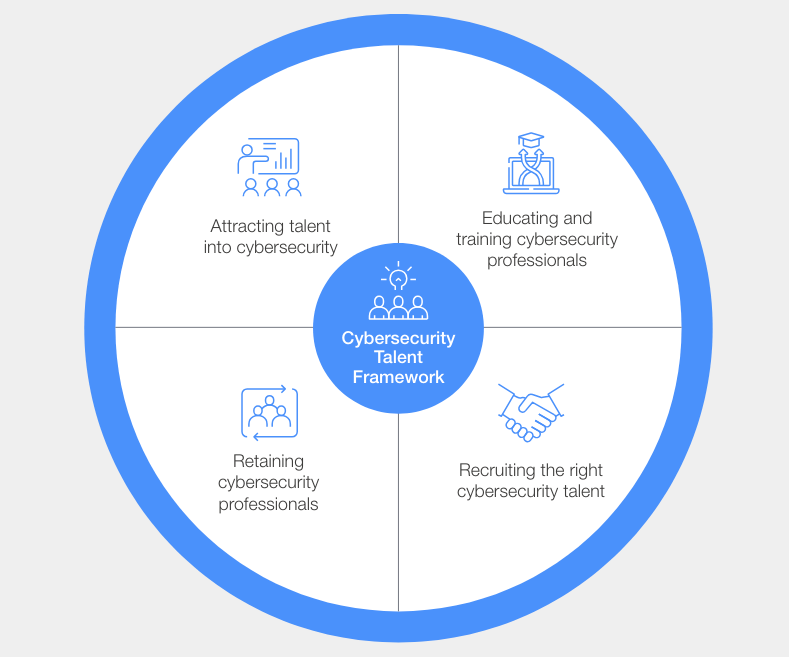The global skills gap is widening as AI and other technologies take hold and workers at all levels lose relevance. Worldwide, the skills gap continues to become more acute as the speed of AI dispersion accelerates. As such, staying competitive in today’s fluid job market requires a commitment to lifelong learning and strategic career development. Future workforce trends emphasize digital literacy, data analysis, and AI proficiency. Creativity, collaboration, critical thinking, and other soft skills are also increasingly valued. Additionally, remote work is reshaping job markets while sustainability, healthcare, and cybersecurity sectors are growing. Continuous learning, reskilling, and upskilling are crucial to close the global skills gap and strengthen career resilience in the future workforce.
This article delves into the intersection of higher education, online learning, and career development in today’s rapidly evolving job market. We’ll provide professionals with actionable insights to stay competitive in the future workforce. We’ll highlight the latest QS World University Rankings, focusing on the top 15, and examine how platforms like edX democratize access to world-class education, enabling professionals to upskill and reskill through courses from global universities. Whether you’re a recent graduate, a mid-career professional, or someone looking to pivot into a new field, this article will equip you with the knowledge to make informed decisions about your educational pursuits and career trajectory. Be sure to follow us on LinkedIn. Now, let’s get started.
QS World University Rankings: A Global Perspective
The QS World University Rankings have long been a respected benchmark in higher education. The 2025 rankings reflect their 21st year of existence, evaluating over 1,500 institutions in 104 locations. These rankings offer valuable insights into the quality and reputation of institutions worldwide, helping students and professionals make informed decisions about their educational pursuits. Moreover, they are the only ranking to emphasize employability and sustainability.
…”half of the skills that exists in the workforce today’s won’t be relevant in just a few years”
Understanding the Rankings
The QS World University Rankings evaluate institutions based on several key metrics, including academic reputation, employer reputation, faculty/student ratio, citations per faculty, and international faculty and student ratios. These criteria provide a comprehensive view of each institution’s strengths, from research output to teaching quality and global outlook.
Acceptance and Quality of the Rankings
The QS Rankings are widely recognized and respected in the academic community and beyond. They offer a global perspective, use multiple indicators, and are updated annually to reflect changes in the higher education landscape. However, it’s essential to approach them with a critical eye. Critics argue that the heavy weighting of reputation surveys may favor older, more established institutions. These challenges are evident in the current rankings. Additionally, the rankings may need to capture the quality of specific university programs or departments fully.

Despite these limitations, the QS Rankings remain valuable for understanding the global higher education landscape and identifying top institutions across various regions. They offer a perspective and serve as a starting point for learners seeking best-in-class course content.
Let’s look at the top 15 universities worldwide by region.
Regional Roundup
Top-Ranked North American Universities
The United States continues to dominate the top ranks, with 6 of the top 15 universities. The list consists of
- #1 Massachusetts Institute of Technology (MIT),
- #4 Harvard University
- #6 Stanford University,
- #10 California Institute of Technology (Caltech)
- #11 The University of Pennsylvania
- #12 The University of California at Berkeley
These institutions are known for their cutting-edge research, innovation, and strong industry connections, making them attractive to students and employees worldwide.
Top Ranked European Universities
European universities, particularly UK universities, maintain a strong presence in the rankings, with 5 of the top 15 universities. The list consists of
- #2 Imperial College of London
- #3 University of Oxford
- #5 University of Cambridge
- #7 ETH Zurich
- #9 University College London
Many European institutions are known for their rich academic traditions, research excellence, and increasing focus on innovation and entrepreneurship.

Top Ranked Asia-Pacific Universities
Universities in the Asia-Pacific have steadily climbed the rankings in recent years, with 4 of the top 15 global universities. The list of Asia-Pacific universities in the world rankings consists of
- #8 The National University of Singapore,
- #13 The University of Melbourne
- #14 Peking University
- #15 Nanyang Technological University, Singapore (NTU Singapore)
These universities are gaining recognition for their strengths in STEM fields, research output, growing international collaborations, and increased investment in higher education. The rise in rankings also reflects the importance of the Asia-Pacific region in world affairs and global and regional commerce.
Implications for Career Development
The global nature of these rankings reflects the increasingly interconnected world of work, and companies seek to optimize talent pools worldwide. For professionals looking to advance their careers, it’s essential to consider institutions’ international reputations when pursuing further education or professional development. Look beyond overall rankings to specific program strengths that align with industry work trends and your career goals. Recognize that top-ranked institutions often have strong industry connections, which can be valuable for networking and career opportunities.

Accessing World-Class Education Through edX
While the QS Rankings highlight the world’s leading universities, the rise of Massive Open Online Courses (MOOCs) has democratized access to these institutions. edX, one of the pioneers in this space, offers a gateway to courses and programs from many top-ranked universities.
edX: A Bridge to Elite Education
Founded by Harvard and MIT in 2012, edX has grown into a global platform offering courses from over 160 leading institutions worldwide. It offers over 3,500 courses from the world’s leading institutions and has a worldwide learner community of over 86 million. Learners can leverage edX to access world-class education through various offerings, including individual classes, MicroMasters programs, professional certificates, online master’s degrees, and XSeries programs. Specific programs, e.g., online master’s and bachelor’s degrees, require direct application to the respective educational institutions.
These options allow learners to study independently and fit education around work and personal commitments. The affordability of edX courses makes high-quality education from top institutions accessible to a broader audience. Many programs are designed with input from industry leaders to ensure relevance to current job markets, and the platform offers opportunities to network with learners and instructors from around the world. Let’s look at some of the top universities on edX and their course offerings.
MIT offers computer science, data science, and engineering courses on the platform. Harvard University provides business, law, public health, and leadership programs. The University of California, Berkeley, is known for its offerings in artificial intelligence and blockchain technology. The National University of Singapore offers highly regarded courses in Life Sciences, while the University of Oxford provides courses on sustainability.
Career Trends and Upskilling Strategies
As we navigate the evolving landscape of higher education and online learning, aligning these opportunities with emerging career trends is crucial. Several key areas where professionals can focus their upskilling and reskilling efforts to stay competitive in the future workforce have emerged. Online education offers the ability for professionals to execute several key career development strategies, including:
- Changing careers
- Sharpening your skills
- Leveling up as a leader
- Earning a degree
Let’s look at some crucial future growth areas in the global workforce and the opportunities to pursue online learning at the world’s leading universities.
In the Online Education market, the number of users is expected to surpass 1.1 billion by 2029
Data Science and Artificial Intelligence
Data Science and Artificial Intelligence continue to be in high demand across industries. Between 2022 and 2032, industry analysts expect demand for data science specialists to grow by 35%. Professionals should focus on developing skills in machine learning algorithms, data visualization, statistical analysis, Python programming, and ethical AI and data governance. edX offers numerous courses in this field, including the MicroMasters in Statistics and Data Science from MIT and the Professional Certificate in Data Science from Harvard.
Selected Data Science and AI Courses
- Introduction to Data Science with Python – HarvardX
- Data Science for Construction, Architecture, and Engineering – MITx
- Semantics of First-Order Logic – Stanford Online
Priority Strategies for Recruiting Cybersecurity Talent

Cybersecurity
Cybersecurity is another critical area as digital transformation accelerates. The recent controversy involving CrowdStrike and ongoing threats from malicious actors suggests the need to build digital resilience. However, the talent shortage in the cybersecurity sector is significant, with an estimated 4 million cybersecurity workers needed worldwide. Key areas include network security, cloud security, ethical hacking, security compliance and risk management, and incident response and forensics.
Selected Cybersecurity Courses
- CS50’s Introduction to Cybersecurity – HarvardX
- CS50’s Computer Science for Lawyers – HarvardX
- Cybersecurity: Managing Risk in the Information Age – HarvardX
Sustainable Business & Green Technology
Sustainable Business and Green Technology are growing in importance as the focus on climate and environmental issues increases. Strengthening climate resilience and the race to Net Zero remains a priority for many communities and companies worldwide. Additionally, green jobs represent a bright spot for long-term growth in the job market. For example, as of 2022, there were more than 12 million renewable energy jobs. Professionals should explore renewable energy technologies, sustainable supply chain management, environmental policy and regulation, circular economy principles, green finance, and ESG reporting. Harvard University and Imperial College of London offer several courses on sustainable development and renewable energy principles through edX.
Selected Sustainability & Green Tech Courses
- Backyard Meteorology: The Science of Weather – HarvardX
- Climate Change: Financial Risks and Opportunities – ImperialBusinessX, ImperialX
- Why Move Towards Cleaner Power – ImperialX

Digital Marketing & E-Commerce
Digital Marketing and E-commerce skills are crucial as businesses increasingly operate in digital spaces. Over 70% of small businesses have a website. Additionally, by 2040, an estimated 95% of purchases will be made online by 2040. With the rapid growth in new business formation and the growth in entrepreneurship and solopreneurship, digital marketing skills are essential to gaming competitive advantage in the years ahead. Focus areas for digital skills include:
- Search engine optimization (SEO).
- Social media marketing.
- Content marketing.
- Data-driven marketing strategies.
- E-commerce platform management.
Leading global universities on the edX platform, like Harvard, offer Executive Education courses in Digital Marketing. These courses can close the skills gap and keep you current with relevant industry trends.
Digital Marketing and E-commerce Courses
- Fundamentals of Digital Marketing, Social Media, and E-Commerce – Wharton Online
- Digital Platforms in Performance – University of Cambridge
- Development in Emerging Economies: The Case of China – Peking University
Healthcare and Life Sciences
Healthcare Informatics and Telemedicine are rapidly growing fields as the healthcare industry undergoes digitalization. An aging global population and the risk of the next major global pandemic are challenges ahead. In 2023, analysts valued the telemedicine market at USD 114 billion, with forecasts to exceed USD 285 billion by 2030, a CAGR of 17.2%. Worldwide demand for healthcare workers also remains high, with an estimated 10 million workers needed by 2030.
- Electronic health records management.
- Health data analytics.
- Telemedicine technologies.
- Healthcare IT project management.
- Medical coding and compliance.
MIT offers courses in health informatics through edX, providing valuable insights into this growing field.
Healthcare and Life Science Courses
- Practical Improvement Science in Health Care: A Roadmap for Getting Results – HarvardX
- Environmental DNA: Sensing the Diversity of Life and Assessing Ecosystem Health – ETHx
- Handling Children In A Healthcare Setting – National University of Singapore

Soft Skills and Leadership Development
Soft Skills and Emotional Intelligence are becoming increasingly valuable as automation increases. Areas to develop include leadership and team management, emotional intelligence, critical thinking and problem-solving, intercultural communication, and adaptability and resilience. While professionals develop these skills through experience, many edX courses focus on leadership and professional development, helping learners cultivate these crucial abilities.
Leadership Development Courses
- Leadership: Creating Public Value – HarvardX
- Empathy and Emotional Intelligence at Work – BerkeleyX
- Technology Entrepreneurship: Lab to Market – HarvardX
Strategies for Lifelong Learning and Career Advancement
To effectively leverage the opportunities presented by top universities and platforms like edX, professionals should adopt a strategic approach to lifelong learning and career advancement. These career strategies include conducting regular skills gap analyses, creating personal learning plans, and leveraging micro-credentials. Other valuable activities include networking globally, applying knowledge in real-world contexts, staying informed about industry trends, and seeking mentorship.
Embrace New Models of Learning
Finally, the convergence of world-class university education and accessible online learning platforms like edX presents unprecedented opportunities for career development. By strategically engaging with these resources and aligning your learning with emerging career trends, you can position yourself for success in the dynamic workforce of the future. In today’s rapidly evolving job market, learning, unlearning, and relearning are the most valuable skills. Embrace lifelong learning, stay curious, and remain adaptable. Your commitment to continuous improvement will enhance your career prospects and contribute to your personal growth and satisfaction in an ever-changing and uncertain world.
To learn more about the world’s leading universities and elite online learning on the edX platform, visit their site or contact the team at ClearSky 2100 Ventures to discuss career strategies and options.
Disclosure: At ClearSky 2100, our portfolio partly consists of affiliate partnerships. We may earn a small commission from buying links on our site at no cost to you.





